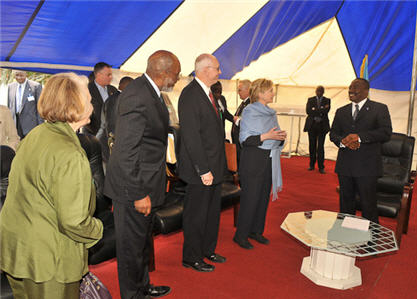
U.S. Secretary of State Hillary Clinton wrapped up her 11-day, seven-nation African tour on Thursday without announcing sincere and pragmatic actions to promote African development except promising financial aid to very few countries she visited.
The tour which began early last week took Hillary to Kenya, South Africa, Angola, the Democratic Republic of Congo, Nigeria, Liberia and Cape Verde.
The United States, the biggest developed nation in the world, should spare no efforts to provide sustainable aid, including financial and technology aid, to the African continent, home to most of the developing countries
While visiting west African nation Ghana in July this year, U.S. President Barack Obama unveiled his administration's foreign policy toward the African continent, vowing to help African countries realize development by increasing aid and investment, creating more trade opportunities for African countries.
So far, the Obama administration has not worked out concrete measures to help the continent, disappointing Africans.
Tom Wheeler of the South African Institute of International Affairs, was quoted by Reuters as saying recently "There were enormous expectations after (Barack) Obama was elected and after the inauguration."
"People thought that the flood gate of aid will be opened but now they are aware of the limitations," said Wheeler.
Ahead of the three-day African Growth and Opportunity Act (AGOA) forum held Kenya's capital Nairobi early last week, African leaders, including Kenyan President Mwai Kibaki, called on the United States to take concrete measures to promote the trade between the United states and Africa so as to achieve substantial progress in the trade sector.
But Hillary, at the forum, did not elaborate how the United States would promote the trade between the two. She, instead, urged the African countries to remove trade barriers among them.
The African Growth and Opportunity Act, which was started to be implemented in 2000 by the then Bill Clinton's administration, is termed as the most favorable trade act approved by the U.S. Congress in its history. In reality, the African countries have not benefit from it so far due to the harsh trade standards and the complicated approval procedures.
The worldwide financial crisis has dealt a heavy blow to the already poor African continent, triggering the sharp drop of exports, the significant reduction of fiscal income, the sharp decrease of capital inflow. More serious is that the dim economic situation has increased the poor and hungry population in the continent.
Helen Clark, the former prime minister of New Zealand and the new administrator of the United Nations Development Program (UNDP), noted in June this year during her visit to Africa that most African countries have lagged far behind in realizing the Millennium Development Goals, a result of the failure of the developed countries to keep their aid promises to Africa.
As Hillary began her African tour, Kenyan Prime Minister Raila Odinga told the U.S. secretary of state "Do not lecture us," stressing that the problems faced by the African countries are created by the Western countries.
For its part, Liberia, the sixth leg of Hillary's African tour, had this to say "The United States must show its willingness in providing Liberia with substantial aid."
Related articles
- • DRC and Rwanda Sign Declaration of Principles for Peace in Eastern Congo (April 25, 2025)
- • European Union Suspends Defence Consultations with Rwanda (February 24, 2025)
- • US Sanctions Rwanda's Minister James Kabarebe for Central Role in DR Congo Conflict (February 20, 2025)
- • Felix Tshisekedi Sworn In as DR Congo President (January 24, 2019)
- • Constitutional Court Declares Tshisekedi Winner of Presidential Election (January 19, 2019)
- • Felix Tshisekedi Vows to Be the President of All Congolese (January 10, 2019)
- • Felix Tshisekedi Elected DR Congo President (January 10, 2019)
- • DR Congo Delays Results of December Election (January 6, 2019)
- • Botswana Urges Joseph Kabila to Step Down (February 26, 2018)
- • No elections in DR Congo in December without electronic voting machines: INEC (February 13, 2018)
- • US Warns DR Congo Against Electronic Voting for Delayed Election (February 12, 2018)
- • Felix Tshisekedi accuses INEC of illegally prolonging Kabila's mandate (October 24, 2017)
- • DRC Seeks Arrest of Presidential Candidate Moise Katumbi (May 19, 2016)
- • Papa Wemba Is Buried in Kinshasa (May 4, 2016)
- • Papa Wemba Awarded Highest National Honor as Thousands Pay Tribute (May 2, 2016)
- • Rights Groups: DR Congo Must Free Pro-democracy Activists (April 13, 2015)
- • Police Open Fire on Crowd Protesting Election Law Change (January 19, 2015)
- • Etienne Tshisekedi Evacuated to Belgium for Medical Treatment (August 16, 2014)
- • Kerry Calls on Kabila to Honor Constitution (May 4, 2014)
- • Kerry in DR Congo for Security Talks (May 3, 2014)
- • U.S. sending more personnel to Uganda to hunt LRA leader Joseph Kony (March 24, 2014)
- • DR Congo Takes Chairmanship of COMESA at Summit in Kinshasa (February 26, 2014)
- • Bosco Ntaganda Attacked Civilians on Ethnic Grounds, ICC Prosecutor Says (February 10, 2014)
- • New DR Congo amnesty law welcomed by UN envoys (February 5, 2014)
- • DR Congo Honors Nelson Mandela, Hero and Model for Humanity (December 6, 2013)
- • Congo Army Takes Control of Mbuzi Hill From M23 Rebels (November 4, 2013)
- • Kabila Congratulates Congo Army for Defeating M23 Rebels (October 30, 2013)
- • U.S. Sanctions Rwanda Over Use of Child Soldiers by M23 Rebels (October 4, 2013)
- • Rwandan Support for M23 Rebels Frustrates Attempts to End Fighting in Eastern Congo (September 26, 2013)
- • M23 Rebels Fired Shells Into Rwanda, Not Congo Army, UN Says (August 30, 2013)







